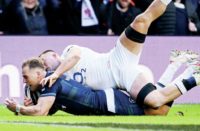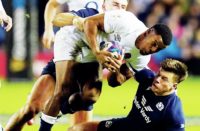 With the wheels now firmly back on the chariot, the dream of Grand Slam glory can at last be whispered. England's win over Ireland, although not exactly executed with style, was convincing enough to make believers of even the most cynical as they showed a measure of maturity and control that has eluded the team since those heady days back in 2003.
With the wheels now firmly back on the chariot, the dream of Grand Slam glory can at last be whispered. England's win over Ireland, although not exactly executed with style, was convincing enough to make believers of even the most cynical as they showed a measure of maturity and control that has eluded the team since those heady days back in 2003.
‘Steady' Eddie has changed his name to ‘Lucky' Eddie as his players looked to have blown their first home game when they failed to keep their discipline in check – but with a little luck and some rather dubious decisions from the match officials, they got through.
Despite having two players sin-binned, England still managed to stifle the Irish and keep them within striking distance, eventually going on to win. Full credit must be given to new defensive coach, Paul Gustard, for refreshing and improving on the work done previously by Andy Farrell.
Even so, it could have been different had the TMO agreed with a lot of the spectators in Twickenham that Mike Brown's attempts to kick the ball out of a ruck fell short of his duty of care to the prone Conor Murray, who had to be helped from the field and received several stitches to a face wound. On another day that may have met with another yellow on top of James Haskell's, or even a red, and left England with serious problems.
I must admit I was surprised when Brown was not punished during the match – but an even bigger surprise was that he was not cited. Brown is not a dirty player but he can get a bit carried away and while I would like to think he would not have back-heeled Murray in the face deliberately, his boot did hit Murray several times. Therefore, while Brown's injury to Murray may not have deliberate act, he was by definition ‘reckless' even if he was unaware of where his boot was in relation to Murray's face.
As Law 10.4(b) – “a player must not stamp or trample on an opponent” – does not mention the word deliberate, Brown must have been in breach and definitely should have been cited.
Consistency is what everybody craves from match officials, particularly in the case of head and facial injury situations. No blame should be attached to Brown for the failure of the match officials (referee and TMO) to protect Murray from injury but World Rugby should take a long hard look at how they train TMOs and citing officers to ensure that all reviews are fair and consistent.
Despite the number of injuries the Irish had going into the game, Ireland proved the first real test for England. Success in that game has raised expectations that Jones quite rightly has tried to quell. Just a few weeks into his tenure, he knows that there are likely to be a few dark clouds ahead as he restructures the team, bringing in a new wave of players over the next two years.
He will know he has been reasonably lucky with those young players that he has given the chance to shine: Billy Vunipola, Jamie George, Anthony Watson, Jack Nowell, Maro Itoje and the best of all, in my opinion, George Kruis.
Kruis has rapidly grown into a line-out king taking some vital steals and showing great composure in a heated game environment, stepping in to calm fellow teammates as tempers flared.
That composure will be vital in the clash next week with a Welsh side that have still yet to reach full pace, despite last week's win over a lacklustre French side that gifted George North his second try in two games. For many, this will be the match that defines the Six Nations this year, a game where the winner will probably take the champions title, particularly as Wales will face Italy at home and England have to travel to Paris in the last round of games.
For me, last week's game between Italy and Scotland was more like the defining game of the tournament so far.
Scotland put in the performance of their lives and were answered by a fully committed Italian side who just failed to match the Scottish intensity in a five-try game that showed both teams can play.
Sometimes, games played at the top of the table have too much at stake to throw caution to the wind and really cut loose – but for those at the bottom they are free to try to expand their horizons.
One of the reasons the game was so good was that the teams were well-matched. Whether they like it or not, Scotland and Italy are some way behind the rest of the Six Nations which impacts on how they and their opponents play.
When teams are well-matched, they have to take risks to break the stalemate that often ensues, but if you play against a team that is weaker, you can slog away until they eventually buckle.
Italy and Scotland know they face the prospect of a sizeable loss if they play expansive rugby against better teams, so they play a more defensive style in the hope of keeping the score down. For the opposition, it is hard to focus when you know you should win and sometimes, as Wales once did against Western Samoa, you let it slip and you lose.
The issue for the Six Nations after a pretty turgid series so far is: how can they raise and maintain standards?


























